Introduction
It’s September 13, and Ryu Ga Gotoku Studio is just over 24 hours away from revealing its big plans for the future. It’ll be a night of celebrities, game announcements, and an infamous afterparty full of alcohol, confetti, and blaring music. It’ll take over Twitter, and leave more than a few people nursing headaches the following day.
But today, instead of focusing on his big night, studio head Masayoshi Yokoyama is sitting in a conference room talking about why he loves the anime Neon Genesis Evangelion.
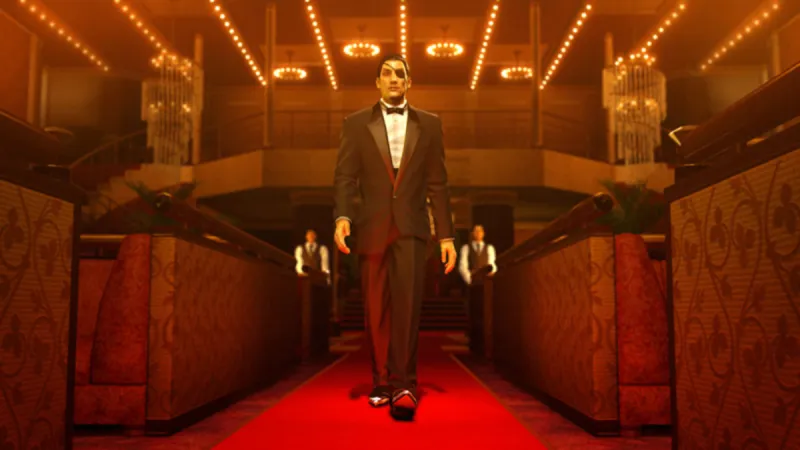
“If you watch a VHS tape enough times, the [plastic tape] inside will start ripping, and then you won’t be able to watch it anymore,” he says. “But if you actually just take tape and tape it back up, it’ll work again. I watched my Evangelion VHS tape and had to repair it three or four times.”
Yokoyama is flanked on his left and right by the six heads of Ryu Ga Gotoku Studio (RGG), each leading a different department and discipline. I’m sitting opposite at a long conference table at RGG’s office in Tokyo, Japan. We’re all here to talk about the future but are admittedly side-tracked. We should be talking about the Yakuza series, especially now that it’s more popular globally than ever. We should also be talking about the fact Yokoyama only recently took his title as head of the studio, and some very high-profile departures made that possible. And we will. But before that, Yokoyama wants to talk about his biggest influence.
“It’s this manga called Oishinbo,” he says, making the room laugh in surprise. “It’s a manga about food. It’s a food thing. Essentially, for me, the Ryu Ga Gotoku [Yakuza] series is probably like Oishinbo, the Yakuza version. I read it the most as a kid; I would just read it over and over. Every week there’s basically a new, ‘This is how you make food.’ So, probably that, but Yakuza?”
There’s confidence in the way the RGG staff speaks. It could be mistaken for cockiness – and perhaps is. But in its defense, especially in the last few years, RGG has the games and sales to back up that confidence. Things might be changing around here, but the team is still laser-focused on its long-running narrative crime series. There’s time to let conversations go off-topic because, as far as the seven leads are concerned, no matter what’s changed or what will change, it’s still business as usual. Even if it isn’t, really.
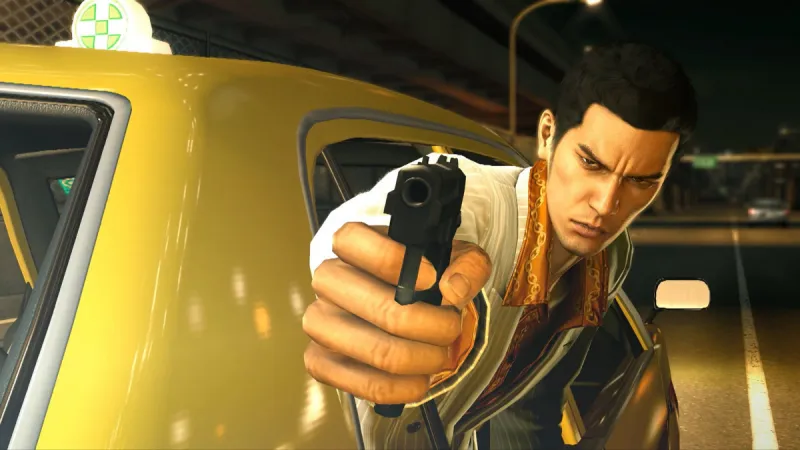
Saving Face
Saving Face
In October 2021, RGG lost its face. Kind of. It depends on who you ask.
Since its inception, Toshihiro Nagoshi – a then-30-year veteran of parent company Sega – had been the recognizable founder and head of RGG. He often spoke for the series and studio in interviews, especially outside of Japan. When people think about the Yakuza series, there’s a good chance they also think of Nagoshi. Despite his age, it didn’t hurt that he was also always ahead of the curve regarding fashion and trends. It was a common sentiment to say he looked like a character from his games.
But he left, as did several high-ranking members of RGG’s staff. Nagoshi, Yakuza series producer Daisuke Sato, Judgment producer Kazuki Hosokawa, and half a dozen other Sega and RGG employees left to form Nagoshi Studio, funded by NetEase. In their absence, Yokoyama, with the company since the beginning, and a longtime writer on the Yakuza series, stepped up, now officially serving as RGG studio director and executive producer.
Largescale and high-profile departures can often look like trouble for a developer. And in the case of RGG, Nagoshi’s departure came during the height of the Yakuza series’ global popularity – beginning with 2017’s hit Yakuza 0, and reaching a fever-pitch with 2020’s Yakuza: Like A Dragon. It was shocking to see the series’ most recognizable face leaving as soon as it really found its wider audience.
But as Yokoyama tells it, it wasn’t such a shock internally. In fact, it was a slow process, and he pushes back on the idea that there was one sole face of RGG.
“We never actually really intended or thought that Nagoshi-san was the face of the company,” he admits. “We all thought that we were also coming out and speaking and being part of it as well.”
This is true to some degree – especially in Japan; himself, Yakuza series chief director Ryosuke Horii, and Yakuza series chief producer Hiroyuki Sakamoto have given tons of interviews and appeared at events over the years. But still, Nagoshi’s name and face is intrinsically tied to RGG’s tentpole series moreso than anyone else’s, and Sato had long been one of the creative forces behind the Yakuza games. The remaining team knew how Nagoshi and Sato leaving would look from the outside. So, alongside announcing their departure, Yokoyama released a lengthy message about the studio’s future. And most importantly, RGG released slick photos of the seven department heads – again, looking pretty similar to the characters in their own games. You can see the infamous group photo in the header of this article and profile shots below.
“I’m really embarrassed about it,” Yokoyama says, laughing. “Initially, it took us a lot of courage to go with this. Because we’re not celebrities. We’re not people who, like, our job is to look really nice for the camera. So, it did take a lot of courage for us to do this.”
“I was very happy that they took a picture of me looking cool,” Horii contradicts.
As they tell it, releasing the picture alongside what could otherwise be seen as bad news was to give people something to look forward to; they wanted fans to see this as a positive change for RGG. The reaction, they say, has been better than expected. Anecdotally, I agree; I didn’t see many negative responses to the internal shake-up when it was announced. RGG’s bosses also seem to think so.
“Even the higher-ups at the company were like, ‘Hey, wow. That’s actually looking pretty good,’” Yokoyama says. “That’s why we took this picture – we wanted people to think that way.”
As far as I can tell, no one left on particularly bad terms, and in fact, days after our interview, Nagoshi tweeted about how much he liked RGG’s announcements from the week. But it does mean new people get opportunities within the studio. And that, as far as Horii is concerned, is a positive change.
“Obviously, Nagoshi-san and Sato-san leaving means that new people get to rise to the top, and we have new leaders emerging,” he says. “I think overall, it’s not that everything up until now was bad, and we want to change it. Basically, it just means it’s good to have new voices coming in. We’re not going to be making any major changes in terms of our [studio’s] values or directions. We think it’s a good amount of change that new people are getting exposed.”
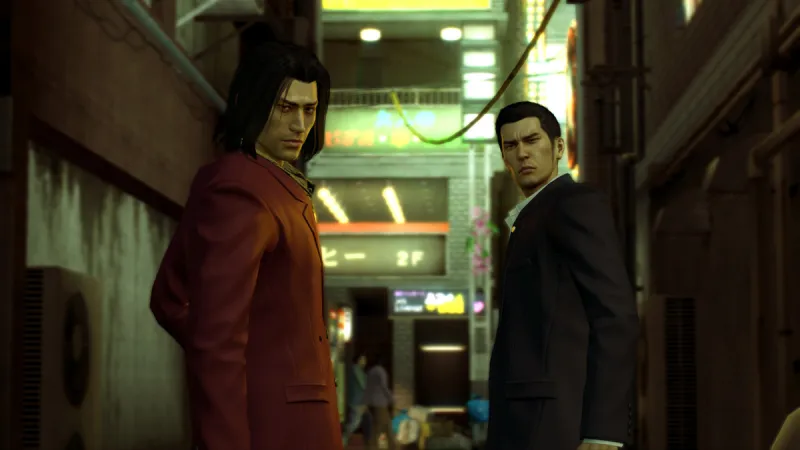
One shift the studio can speak to now is the amount of non-Japanese working at RGG. As Yokoyama tells it, its workforce has many employees from all over Asia. He hopes to continue this trend, creating a more multicultural studio. He says he imagines a scenario where we’re sitting in this same room in the future, and there are heads of the studio that aren’t from Japan.
And the working conditions for those new employees are supposedly better than at the beginning of RGG. Yokoyama compares the company’s early schedule to those of night hosts; they’d come to work in the middle of the night and go home in the middle of the morning.
“Now, we’re all living very healthy, responsible [lives],” he says, laughing. “We come in at, like, 8:00 a.m., 9:00 a.m. […] We all got married; we had kids.”
That work-life balance is something the studio heads claim they try and pass down to their employees, too. So long as the games get made.
“As leaders, we want people to maintain healthy lives,” Yokoyama says. “But all of our development team is relatively free to decide when they want to come in and when they want to leave. Though our development cycle is quite fast, we make sure that everybody who is working on our games can maintain the lifecycle that they want to. And if something doesn’t turn out well, we’ll go back to the drawing board and we’ll remake it and keep doing things over again. We think we’re craftsmen in that sense. Generally, because of that, we don’t want to make a rule, like, ‘You have to be at work from 8:00 a.m. to 5:00 p.m. We’re saying, ‘You can do what you want. Just get your job done.’”
We didn’t get to talk to any RGG employees beyond the leads of the studio to ask about their work schedules. But if what Yokoyama says is true, it’s a refreshing take from the head of a game developer – especially one as prolific as RGG, which often releases a game a year and is about to announce three in one day.
That Settles That
That Settles That
Horii’s life’s work is not the Yakuza series. It’s karaoke. And he has the stats to prove it.
Horii keeps a spreadsheet of all the songs he can sing at karaoke. Once a year, he prints out the most up-to-date version and carries it around with him. Figuring he might need it today, he printed out a new one just in case. When he hands it over, I look over the meticulous details, spread across a staggering 7,964 songs.
Growing up, Horii was a massive Sega fan. He even owns eight Sega Saturns – a fact he proudly proclaimed during his job interview all those years back. But karaoke arguably got him into the door and helped him rise the ranks.
“[During my job interview] they asked me about myself. I said, ‘My hobby is karaoke,’” Horii told Denfaminicogamer in 2018 (translation via Carrie Williams). “When I had the final interview with Nagoshi, he said, ‘A lot of guys have karaoke as a hobby,’ which is, of course, true. So I had to find some way of showing him, ‘I’m not like those other guys.’
“So I showed him my karaoke list I showed you before, saying, ‘Other guys don’t do this,’ with a bit of a smile, and I was offered the job.”
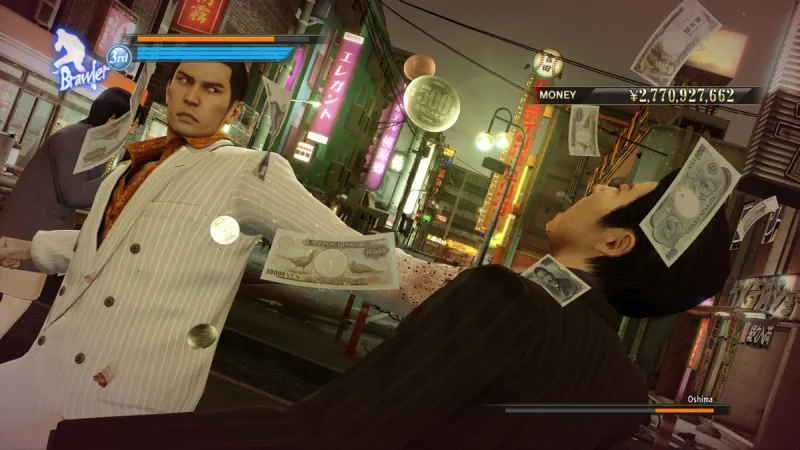
For a long time, Horii worked on side content in the Yakuza games. In the samurai-themed, Japan-only spinoff Yakuza: Kenzan, he created the waterfall training rhythm-based minigame, which steered him to leading Yakuza 3’s karaoke minigame. A perfect professional circle if there ever was one, but one with hardship. Initially, he says coworkers criticized him for going too far with the minigame – at the time, it was uncharacteristic to have the generally-stoic protagonist, Kiryu, doing something so goofy. But his instincts proved correct; it became one of the most popular features in the Yakuza series and went a long way in humanizing Kiryu.
These days, Horii is probably most well-known for directing Yakuza: Like A Dragon – a radical departure for the series, trading its signature brawler combat for turn-based RPG action. Now he’s directing its sequel.
Horii highlights how RGG lets its employees experiment or alter the series’ formula, taking it in radically different directions than previous games. Which is a defining trait of the series’ biggest entries, Yakuza 0 and Yakuza: Like A Dragon. The former is a prequel, taking the story all the way back to the ’80s during Japan’s economic miracle. It reimagines characters and tells the background stories behind how they became who they are in modern games. The latter introduces a new cast of characters, story themes, and the aforementioned play style.
From RGG’s perspective, the success of these two games comes down to a few key points. The first is Yakuza 0’s localization. Historically, the series had never received heavy localization efforts, especially as the series went on and western success seemed like it wasn’t ever going to happen. Yakuza 0 proved that assumption wrong.
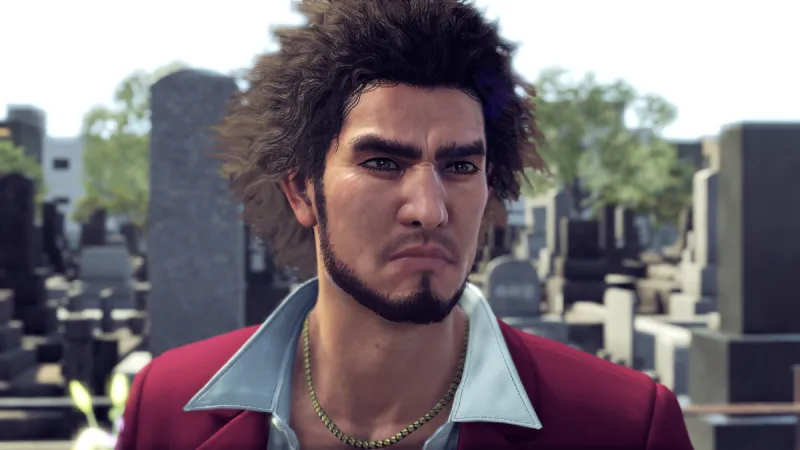
As told by Yokoyama, the second reason was both games were good entry points into the long-running series; they invited people who were curious about the Yakuza games but didn’t have a good jumping on point. In fact, to drive that point home, in the west, Yakuza: Like A Dragon dropped the number convention. In Japan, it’s still Ryu Ga Gotoku 7.
These two games helped turn the series into something of a phenomenon worldwide, and there’s no shortage of games for that massive influx of fans. In total, there are 19 different Yakuza games, including mainline and spin-offs, all released nearly yearly since its debut in 2005. Since the series took off in 2017, seven of those games have been released worldwide (this includes some released in Japan before 2017). This doesn’t include other RGG-developed games such as Binary Domain, Super Monkey Ball, and Fist of the North Star: Lost Paradise.
But RGG isn’t slowing down. The day after our interview, during a Like A Dragon event, the studio announces a remake of the once-Japan-only Like A Dragon: Ishin to be released in 2023, Like A Dragon Gaiden: The Man Who Erased His Name for the same year, and the long-awaited Like A Dragon 8 for 2024. RGG caps the night off with a massive afterparty to celebrate the news. It’s also worth pointing out: the studio officially changed the series’ name worldwide to match its Japanese name – and reflect the declining prevalence of the Yakuza both in the fiction and the real world. The Yakuza series is now the Like A Dragon series.
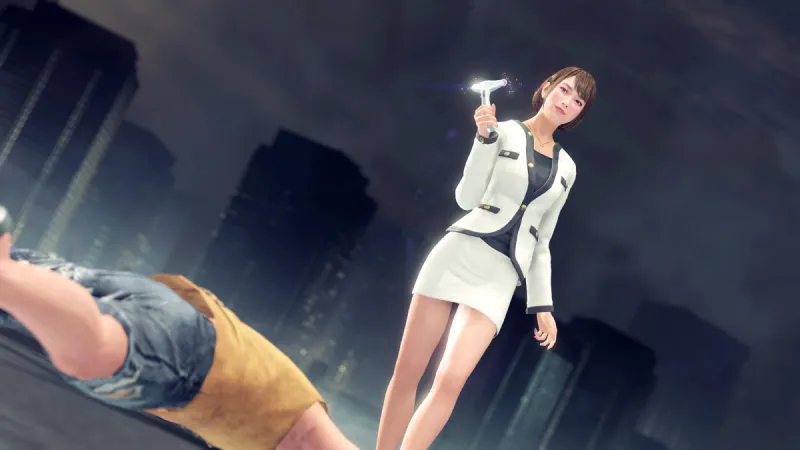
The name change highlights a few key points. One is that RGG isn’t afraid to rebrand its cash cow at the height of its global popularity and recognizability. Two, especially compared to other annualized series like Call of Duty, which despite their continued immense success are plagued by conversations about “franchise fatigue,” people still seem more than eager to devour RGG’s games. When asked why the team thinks that is, Sakamoto quickly answers.
“In the end, people play our games, and they see the quality is there, and the games are still fun,” he says. “So, I think that kind of settles the question.”
Even if it’s always experimenting, according to these seven, no matter what’s changed around here, it’s business as usual. They’re here to make video games the way they want to make them. And the continued popularity of the Yakuza series around the globe hasn’t changed that fact.

“Just like you write articles, we make Yakuza games,” Yokoyama says. “That’s our daily lives. For us, whether or not we have a strange feeling about it? Not really. We’re continuing doing what we’re always doing.”
“Yeah, things just haven’t changed here,” Horii adds. “We just make what we think will be fun.”
“Maybe it’s an American picture,” Yokoyama says. “But from us, we notice, ‘Oh hey, look. Looks like profit numbers in the U.S. are up a little bit. We’re selling a little bit more; that’s cool.’ I guess we’re being interviewed now here. So maybe that’s like, ‘Oh, people are noticing us more.’”
It’s a little confusing; RGG both says things around the studio feel the same yet offers numerous examples of how it’s changed. Maybe when you’re in it, you can’t always identify what around you is different until you zoom out with a 50-foot lens. Or until a reporter asks. But nevertheless, time marches on. Maybe in another 10 years, things will still feel the same as they do now for the people remaining at RGG. And maybe when they take a second to see the bigger picture, they’ll notice how much has changed.
Natural
Natural
Yokoyama asks Sakamoto to take out his business card so he can show us something. As he points out, the studio isn’t actually called Ryu Ga Gotoku Studio. It’s Sega’s First Development Division. RGG is just a nickname, he says.
But no matter what you call it, the studio is best known for its Yakuza (Like A Dragon) series. Maybe one day, that won’t always be the case.
“We have lots of other not-announced titles,” Yokoyama says. “Things outside of the same Ryu Ga Gotoku universe that we’re working on.”
Things will change; they always do. In 10 years, none of these men may still be working here. Or maybe all of them will, but they’ll be joined by seven other developers, all rising into leadership positions, taking the studio in wildly different directions.
From the outside, maybe it seemed drastic that Nagoshi left. But for Yokoyama, this is just what happens. It’ll happen again, probably. He says he’s bad at envisioning the future, but change isn’t bad. It’s just how things work out.
“All these members here have been doing this same job together for over 10 years,” Yokoyama says about the team around him. “We knew that one day a split would come, and somebody would end up leaving and doing something else. I think that’s a natural thing. This is when the first split happened. At some point in the future, it might happen again. [Someone else] might leave to do something that they want to do.”
He reiterates one more time, “Things naturally come about.”
This article originally appeared in Issue 351 of Game Informer.
